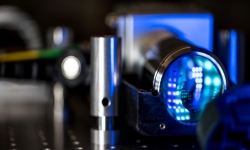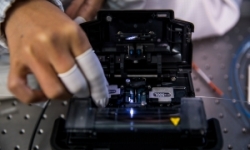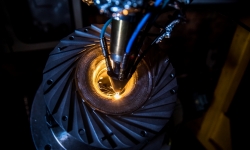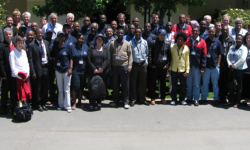African Laser Centre
About the African Laser Centre
The African Laser Centre (ALC) is a virtual research and development centre dedicated to advancing the field of photonics, specifically laser technology and its applications in Africa. Established in partnership with leading partners across Africa, the ALC's mission is to promote innovation, collaboration, and education in photonics science and technology to support the economic and social development of Africa.
The ALC aims to enable research and development across Africa in the field of photonics and photonics applications, by supporting collaborative research and development projects and initiatives.
Annually, the ALC programme supports several collaboration projects. These projects cover topics in all application areas of photonics, including health, communication, manufacturing technology, environmental sensing, and energy applications.
Projects supported are relevant and aspects such as scientific merit, opportunities for human capital development and the potential for socio-economic impact are taken into consideration. Projects are structured to also support the training of the next generation of African scientists and engineers in photonics-based science and technology. We also aim to actively engage with industry partners to transfer our knowledge and technologies to the private sector, supporting the development of new products and services that can benefit the African economy.
We are committed to fostering a culture of excellence and inclusivity, and we actively support collaboration between researchers from diverse backgrounds and disciplines. Together, we are working to build a brighter future for Africa and the world.
In addition to our research and development activities, the ALC also serves as a regional hub for laser science and technology, hosting workshops, conferences, and training courses to promote knowledge sharing and collaboration among scientists and engineers from across the continent.
Mission:
Our mission is to contribute to the development of African economies, their global competitiveness, education, and welfare by enabling African nations to collaborate with each other and globally to grow science and technology using light.
Programmes:
Research and collaboration programme
This research programme typically facilitates collaboration between institutions across Africa. The key objective of the programme is for scientists and engineers to work together to develop new laser-based technologies for various applications. With the advancement in the field of laser technology, laser-based technologies have become an integral part of many areas of research including material science, medicine, and defense.
In response to an ALC grant, the Council for Scientific and Industrial Research receives from the Department of Science and Innovation, the Photonics Centre awards grants to support research collaborations across the continent. A peer review panel evaluates each proposal submitted to the Photonics Centre. The grant funding covers mobility and consumables for approved research collaborations.
Objectives of the programme:
- Increase continental research collaborations
- Increase the number of postgraduate research students (doctoral students are expressly targeted);
- Increase research fellowships and visitor ships.
The research programme is aimed at establishing, maintaining, and strengthening laser-based collaborative research networks on the continent of Africa.
Training programmes:
The ALC programme supports several training interventions which has as objective to support skills development and training in the field of Photonics on the African continent. Details of the different programmes include the following:
ALC Scholarship Programme:
The ALC Scholarship Programme is designed to support post graduate studies for students in the field of Photonics. This programme is designed to also stimulate and strengthen developing research collaborations between research groups on the African continent. The scholarship programme has the objective to support post graduate studies, with the hope that students that have completed their doctoral studies will return to their home countries to establish new research capacity at their local universities.
ALC Knowledge Exchange Programme
The ALC Knowledge Exchange Programme (KEP) grant scheme focuses to support the development of centres of expertise in photonics related disciplines across the African continent.
The ALC KEP specifically supports the mobility of Doctoral and Master’s degree students on short-term exchange visits between research institutions across Africa. Under the ALC KEP, researchers and students are offered financial support to visit a collaborator’s laboratory to share or to gain knowledge, capabilities and know-how that will support the development of new capabilities and competencies at research groups across Africa. The ALC KEP specifically focuses on African students at postdoctoral or doctoral level to visit a collaborator’s laboratory to gain experience or to have access to specialised equipment, with the ultimate objective to grow his or her home research group. The ALC KEP therefore specifically focuses on knowledge and technology transfer support between African research groups.
ALC Training programme
The ALC training grants are designed to stimulate and grow a new generation of laser researchers and technicians on the African continent through laser and laser-related training.
Objectives of the programme:
- Support the establishment of research and development capabilities on the African continent
- Support human capacity building in laser-based sciences and engineering disciplines
As part of its training programme, the ALC typically provides the following types of training:
- Photonics-related symposium/conference/seminar or winter school-type event or topical workshops focusing on laser technology or laser technology applications
- Laser technician training workshops
- Short courses for researchers covering theory and practical training courses
Projects
Projects funded in the 2022/23 year covers the following topics:
| Project title | Participants |
| Experimental investigation and validation of various laser material processing models for industrial manufacturing. |
Contacts: |
| Anticancer and anti-inflammatory activities of medicinal plants: Elucidation of molecular mechanism of action using laser-based technologies. |
|
| Anti-diabetic properties of African Medicinal Plants: Exploring molecular mechanisms using flow cytometry and high content analysis. |
|
| Development of an Optical Coherence Tomography setup and its application in the investigation of surface morphology of certain materials. |
|
| Large Area Laser Beam Induced Current characterization of photovoltaic modules. |
|
| Application of up converting luminescent materials to enhance the performance of Si-based solar cells. |
|
| Development of wear and oxidation/corrosion resistant coatings for power generation and mining sectors via laser induction hybrid cladding (LIHC) process. |
|
| Bi-doped oxide-based phosphors for Luminescence and solar cell applications. |
|
| Selective Laser Manufacturing of Nitinol (Ni Ti alloys). |
|
| Re-manufacturing of new automotive components from end-of-life components via hybrid selective laser melting/high speed machining (HSLM/HSM) technologies. |
|
| Quantum Key Distribution with hybrid vector states of light |
|
|
Surface Integrity and Environmentally Assisted Cracking Resistance of Metal Alloys Processed by Laser Shock Peening without Coating |
|
| Advanced laser modulation formats for telecommunication applications. |
|
| Near-IR femtosecond laser-induced bacteria inactivation |
|
| Point of care photonic crystal biosensor for HIV detection and viral load quantification. |
|
| Effect of Cannabidiol derivatives in enhancing Hypericin mediated photodynamic therapy using gold nanoparticles as delivering systems in human cancer cell lines. |
|
| Elastic properties of composite transition metal nitrides, oxides and chalcogenides by surface Brillouin scattering, picosecond ultrasonic and computational ab-initio methods |
|
| Towards a model for LIBS hardness measurements. |
|






